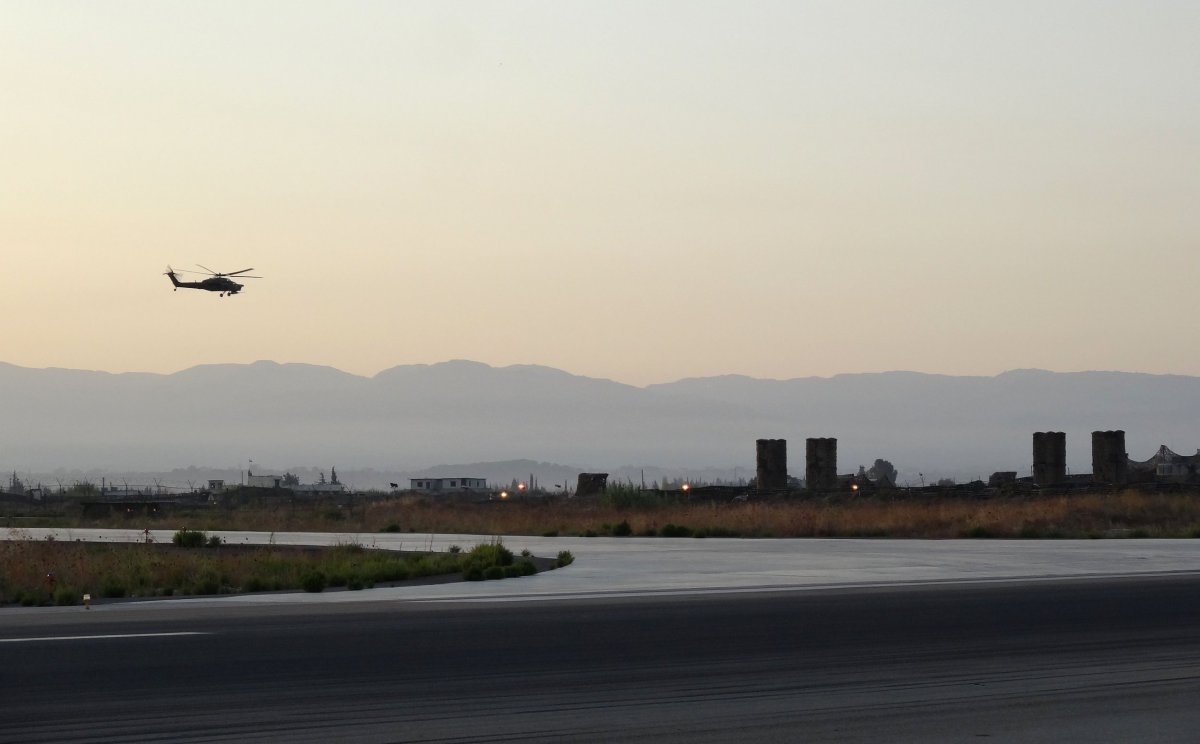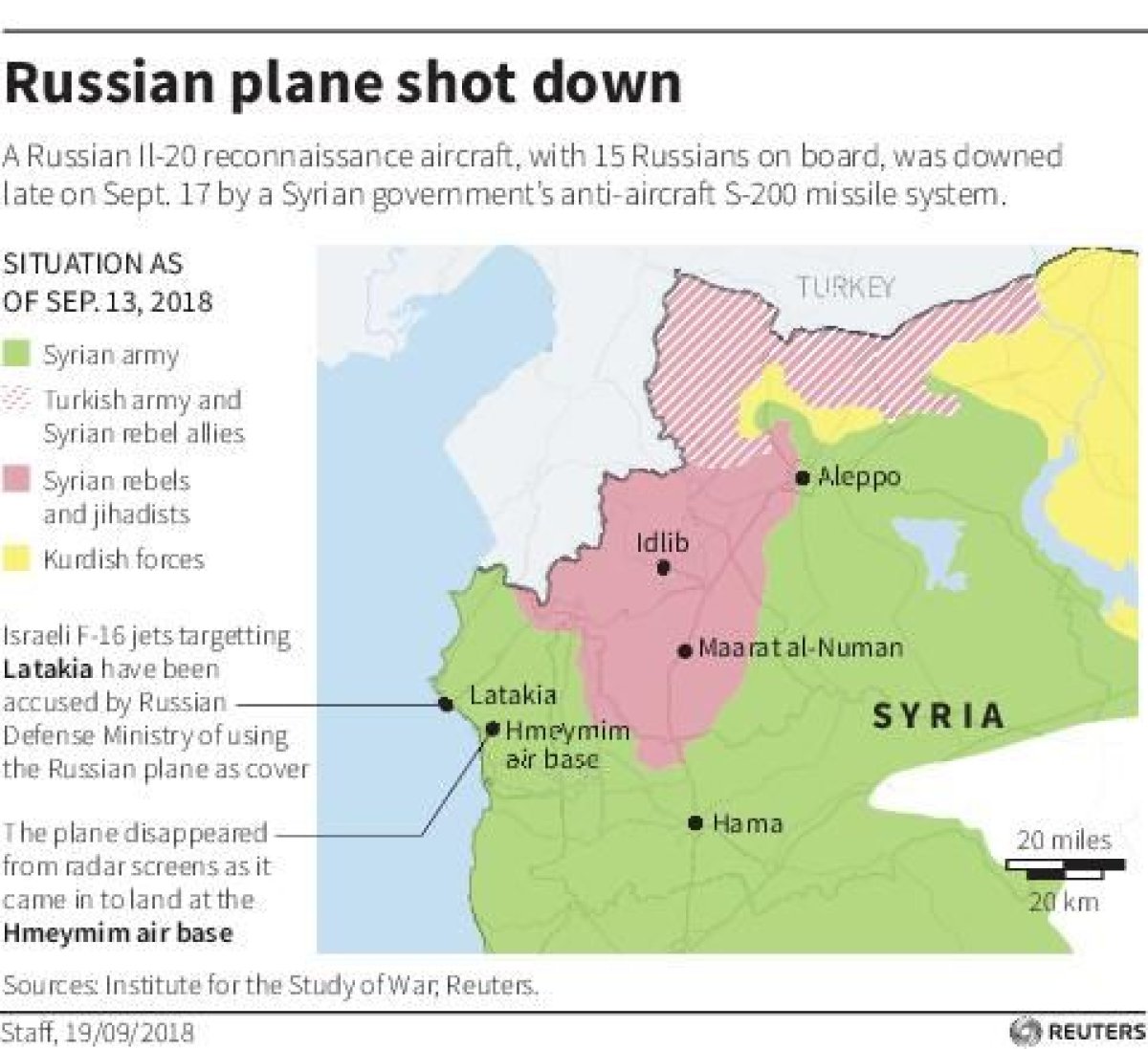The U.S.-led coalition has expressed concern over Russia's decision to equip its allies in the Syrian military with a newer anti-aircraft system in the wake of a deadly friendly fire incident between the two partnered forces.
The Russian Defense Ministry announced Monday that the "command posts of Syrian air defense forces and units will be equipped with automated control systems only supplied to the Russian armed forces," referencing the S-300 surface-to-surface missile system capable of taking down aircraft and cruise missiles. The Syrian military currently uses an older version of the system and fired it in response to an Israeli air raid last week, accidentally hitting and destroying a Russian Il-20 surveillance plane in the crossfire in an incident that has set off already heightened international tensions regarding the seven-year conflict.
The U.S., which leads a multinational coalition battling the Islamic State militant group (ISIS) in Iraq and Syria, is also active in the country, but operates separately from Syrian President Bashar al-Assad and his Russian and Iranian allies. While the U.S.-led coalition maintains a de-confliction line with Moscow, it is not known to be in direct contact with the Syrian armed forces, which are set to receive the new Russian weapon within two weeks.
"The Coalition will continue to de-conflict air and ground operations with Russian military officials as we support our partners in the lasting defeat of ISIS in NE Syria. The safety of all Coalition personnel is of the utmost importance so anytime new equipment to the region is introduced, it is a concern, but we will continue our professional military exchanges to prevent accidental targeting or unnecessary escalation between Russian-backed Syrian regime forces and Coalition-backed Syrian Democratic Forces," coalition spokesperson U.S. Army Colonel Sean Ryan told Newsweek in a statement.

"Any additional weapons being provided to the Assad regime risks an exacerbation of the conflict and an escalation of the humanitarian situation," Pentagon spokesperson Army Lieutenant Colonel Konè Faulkner told Newsweek in separate statement.
"We call on all parties to support the U.N.-led Geneva peace process to resolve the hostilities in Syria under UNSCR 2254," he added, referring to the U.N. Security Council resolution calling for a ceasefire and political settlement in Syria.
Russia and Syria both hold Israel responsible for last week's incident, but the U.S. and Israel has laid the blame on its top foe Iran, who it accuses of arming regional, mostly Shiite Muslim militias that consider Israel to be an occupier of Palestinian territory. Israel has been attacking suspected Iranian positions in Syria since at least 2013 and said earlier this month that it has staged more than 200 such operations in the past two years alone. National security adviser John Bolton said Monday that Iran was responsible for the Russian plane's downing and criticized Moscow's response.
"We think introducing the S-300s to the Syrian government would be a significant escalation by the Russians ... and something that we hope, if these press reports are accurate, they would reconsider," Bolton told reporters, according to Reuters.
"There shouldn't be any misunderstanding here ... The party responsible for the attacks in Syria and Lebanon and really the party responsible for the shooting down of the Russian plane is Iran," he added.
The U.S. has backed Israel's right to attack Syria and has bombed Syrian government sites on two occasions last year and earlier this year in response to alleged chemical weapons attacks that the Syrian government and its allies deny. The U.S. has recently threatened to again take action alongside Western allies France and the U.K. should the Syrian military go through with an offensive on Idlib, a northwestern province that is the last to be under the control of an Islamist-led insurgency.
Western powers, which once backed the 2011 rebel and jihadi uprising against Assad, have since focused on defeating ISIS, but have accused the Syrian leader of committing war crimes and have urged for him to step down. Assad has vowed to reclaim the entire country and has called for the complete withdrawal of the U.S., France, Turkey and any other foreign forces other than Russia and Iran, who he considers legitimate partners.
The Syrian Democratic Forces, a mostly Kurdish group of local fighters has begun a final push to defeat ISIS in eastern Syria, where pro-Syrian government fighters are deployed across the Euphrates River parallel fight against the jihadis. The two factions are currently in talks over the post-war governance of Syria and mutually oppose the presence of Turkey in northwestern Syria, where Syrian troops and their allies have surrounded Idlib in anticipation of military action.

Fearing a humanitarian crisis, Turkey reached a deal with Russia last week that would see the creation of a rough 9-12 mile-wide buffer zone in the final bastion of opposition influence. The agreement, which was announced just hours before the Israeli strikes, would include the withdrawal of jihadi groups such as the Hayat Tahrir al-Sham coalition that dominates Idlib province and the removal of heavy weapons by October 15.
Responding to a question about the deal struck between Turkey and Russia over Idlib, Ryan told reporters during a press briefing Tuesday: "I'll tell you what, if this holds up and it can save lives and avoid the humanitarian disaster that it could have been, then we're definitely supporting that. But that's definitely a decision between Russia and Turkey, and the coalition was not involved with that."
"What we want is a political solution that will save lives, is what we're really looking at," he added.
Uncommon Knowledge
Newsweek is committed to challenging conventional wisdom and finding connections in the search for common ground.
Newsweek is committed to challenging conventional wisdom and finding connections in the search for common ground.
About the writer
Based in his hometown of Staten Island, New York City, Tom O'Connor is an award-winning Senior Writer of Foreign Policy ... Read more
To read how Newsweek uses AI as a newsroom tool, Click here.








